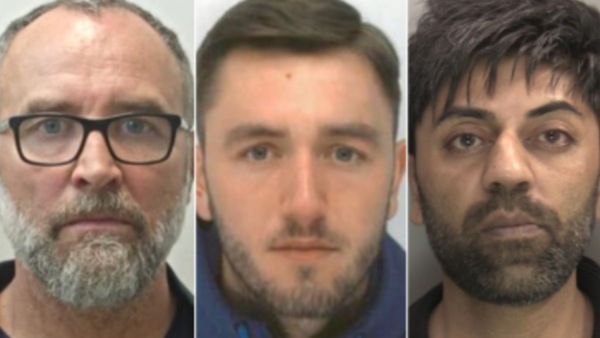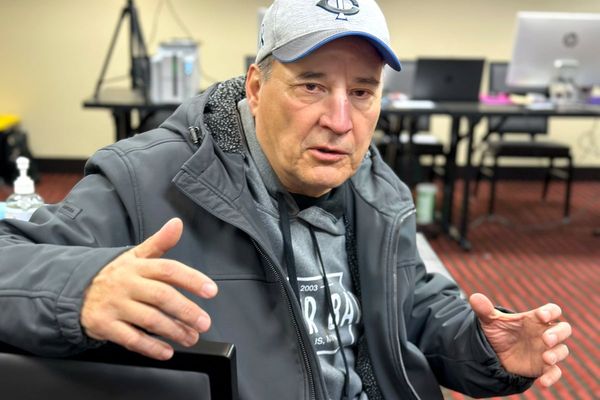HEALTHCARE for transgender Scots needs radical reform as the system is “fundamentally broken”, the Sunday National has learned.
As Trans Awareness Week comes to a close and the Gender Recognition Reform Bill is making its way through the parliament, three trans women have shared their experiences and struggles trying to access basic healthcare, as they called for a progressive shift in the way it’s delivered across the country.
Scotland has four NHS Gender Identity Clinics (GICs) – Edinburgh Chalmers, Aberdeen Cornhill, and Inverness Raigmore, which see adult patients only, and Glasgow Sandyford, which sees a combination of adults and young people.
Earlier this year, it emerged that the number of under-18s seeking gender reaffirming care at the Sandyford clinic had risen from 151 in 2017 to 903 this year. And while the waiting list grows, so does the length of time trans patients are stuck in limbo without treatment or support.
Heather Herbert started her transition in 2015 when she approached her GP, but would be left on a waiting list for a year and a half, describing it as the “worst part” of her transition period.
The 47-year-old said: “I was presenting as me but I hadn’t gone to a GIC or anything, so obviously I wasn’t on any hormones or anything.
“It was very much a case of feeling like nothing was moving forward, which was quite demoralising and quite scary.”
When she finally got an appointment in Aberdeen, one of the “better” places to seek treatment, Herbert said it felt like a relief despite the delays, but noted horror stories of those waiting eight years to be seen.
Herbert said: “That 18 months was probably one of the worst periods of my life.
“The closest I’ve come to taking my own life was at that point. Thankfully I didn’t.
“This is why people end up going online and buying hormones. It’s a safer bet than just waiting.”
After a first appointment at a GIC, the clinic then tells the trans patient’s doctor they can prescribe the hormone treatment, but there can still be other delays, or issues with GPs who don’t have the training, knowledge or confidence to treat a trans person, Herbert explained.
“I know tonnes of other trans women who DIY,” said Beth Douglas, who had her own rollercoaster journey trying to access hormone treatments.
The 29-year-old first bought oestrogen and testosterone blockers from an online pharmacy after getting fed up waiting to be seen by the GIC. Her GP in Paisley was understanding and prescribed her bridging hormones so she didn’t end up taking anything “dodgy” until the GIC finally signed off on a regular prescription.
An issue with testosterone blockers and frustration with how slow the clinic was to do “something as very basic as send a letter” to allow her GP to change prescription would ultimately lead her to buying hormones online again.
“Yes you’re paying money for it, but we don’t need to ask an old man behind the desk, ‘can we do what we want with our own bodies?’” she added.
For Douglas, it’s simply an issue of bodily autonomy, and she draws parallels to the fight for rights to abortion access, and asking the “very basic questions of what you can do with your own body without asking a stranger’s permission”.
She points out that the two procedures which require two separate doctors to sign off on a mental evaluation are an abortion and trans people accessing Hormone Replacement Therapy (HRT) and gender reaffirming surgery.
“When it’s really basic stuff like HRT, where effects are reversible within the first couple of years, and you’re old enough to make these decisions, why do we constantly have to ask people for different permissions?”
Douglas has little faith in the current system, which she says was “set up to slow down the process and question trans people”.
“At the end of the day a lot of people think GICs will prescribe medication, they tell the GPs it’s ok to prescribe the medication,” she adds.
For trans students, who are on a limited income, having to spend £60 a month or more to access “basic healthcare” is “completely unacceptable”, and can leave many worse off, says Ellie Gomersall.
The 22-year-old NUS Scotland president has been on a waiting list for more than four years and sought some healthcare privately, and says that although she is lucky to have a supportive family, they aren’t in a position to help her financially with healthcare. She believes the system is “fundamentally broken” and has completely lost faith that she will be seen in the near future.
“The point I’m at now is that I think I’ve got a better chance of campaigning for reform and getting access to it through that, I think reform will come before I reach the top of the waiting list and that’s the position that we’re in,” Gomersall said.
Once trans people finally get an appointment with the GIC, the process is filled with psychological assessments, and many feel a need to conform to gender stereotypes or fear they will not be given life-saving treatment, she adds.
Herbert, Douglas and Gomersall all came to the same point – that they believe trans healthcare should be given by GPs, and treated in the same way as gender affirming care is given to cis patients.
Gomersall explained: “If you’re thinking about things like hormone replacement therapy for postmenopausal women, if you’re thinking about anyone who wants to have any plastic surgery, all of that is gender affirming.
“Only trans people have to go through the whole rigmarole of the psychiatric assessments and confirming for years as to whether or not we actually want it. We’re not trusted to make the decisions of our own bodies, where people who aren’t trans always are.”
Herbert believes if trans healthcare was put in the hands of GPs, and they were given training and support, it would remove the burden from trans people to constantly fight and advocate for their own care.
“It comes from an almost antiquated way of looking at trans people, that being trans is mentally ill,” she explained.
Douglas, now living in Govan, Glasgow, agrees, and thinks that the government shouldn’t spend money trying to fix the “gatekeeping” and centralised GIC system, and instead recruit and fund training for GPs, nurses and other health care workers.
“If GPs are trained and know how to deal with trans patients, then they don’t need to send their patients away,” she said.
Gomersall points out that trans healthcare has a very small recruitment pool.
“There’s not more people there waiting to get jobs,” she adds, “and so actually, the reality is, is that the whole system needs to be transformed into one where GPS, nurses, other health care professionals are trained and able to provide the health care that they provide to everyone else, to trans people as well.”
Today marks Transgender Remembrance Day, which commemorates all transgender people lost to violence and bigotry, something thankfully rare in Scotland and the UK.
Douglas explained: “We know in South America there’s huge amounts of femicide and trans femicide, and here [in the UK] trans people do die on waiting lists waiting for health care.”
A Scottish Government spokesperson said: “We are committed to improving access to and delivery of gender identity healthcare in Scotland and in May this year we published the NHS Gender Identity Services: Strategic Action Framework 2022-2024.
“We are supporting new service models, addressing waiting times and supporting those waiting to access services.
“We will also support staff development and drive service improvement through enhanced data collection and reporting.”







